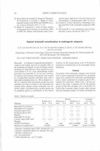 1 citations,
October 2023 in “Romanian Journal of Morphology and Embryology”
1 citations,
October 2023 in “Romanian Journal of Morphology and Embryology” COVID-19 can cause various skin issues, but long-term skin problems are rare.
 1 citations,
September 2019 in “Practica medicală”
1 citations,
September 2019 in “Practica medicală” Hair loss is linked to heart disease and metabolic syndrome, and while current treatments vary in effectiveness, more research is needed for better solutions.
 March 2024 in “Buletin de psihiatrie integrativă (Print)”
March 2024 in “Buletin de psihiatrie integrativă (Print)” Hair loss from telogen effluvium can cause mental health issues and lower life quality, needing both medical and emotional support.
 November 2023 in “Martor”
November 2023 in “Martor” People still turn to witchcraft for help with modern problems despite technological advances.
 June 2023 in “Buletin de psihiatrie integrativă”
June 2023 in “Buletin de psihiatrie integrativă” Alopecia causes significant emotional distress and psychological issues, requiring combined skin and mental health treatment.

Non-invasive methods can effectively diagnose and manage alopecia areata.

The hair masks are safe, stable, and effective for hair care.
 August 2020 in “Revista de chimie”
August 2020 in “Revista de chimie” Nitroglycerin ointment is now used to treat several skin conditions with fewer side effects.
 January 2020 in “Annals of the Academy of Romanian Scientists Series of Medicine”
January 2020 in “Annals of the Academy of Romanian Scientists Series of Medicine” Folliculitis decalvans is a rare skin disease causing hair loss and requires personalized treatment.
 December 2019 in “Buletin de psihiatrie integrativă”
December 2019 in “Buletin de psihiatrie integrativă” Skin treatments can improve both skin health and emotional well-being, but they require careful management of patient expectations and potential addiction risks.

Low-level laser therapy combined with Neoptide improved hair regrowth better than either treatment alone in rats.
 November 2021 in “Research Outreach”
November 2021 in “Research Outreach” Low testosterone levels may lead to more severe COVID-19 outcomes.
 2 citations,
January 2016 in “Andrology”
2 citations,
January 2016 in “Andrology”  December 2015 in “Journal of Neurology and Stroke”
December 2015 in “Journal of Neurology and Stroke” A man had a stroke after getting a scalp injection for hair loss.
January 2020 in “Journal of Clinical Dermatology” Treating underlying metabolic and hormonal issues is key to managing female hair loss.
 1 citations,
May 2023 in “Frontiers in Pharmacology”
1 citations,
May 2023 in “Frontiers in Pharmacology” Millet seed oil may help hair grow by activating certain cell growth signals.
 March 2024 in “Daehan budongsan hakoeji/Daehan bu'dongsan haghoeji”
March 2024 in “Daehan budongsan hakoeji/Daehan bu'dongsan haghoeji” Different factors like age, size, and location of subway stations affect sales of hair salons, coffee shops, and convenience stores in Seoul differently.
241 citations,
August 2005 in “Journal of Investigative Dermatology Symposium Proceedings” Dandruff and seborrheic dermatitis are caused by yeast feeding on scalp oils, leading to irritation and flaking.
 125 citations,
May 2007 in “Journal of The American Academy of Dermatology”
125 citations,
May 2007 in “Journal of The American Academy of Dermatology” The BASP classification is a detailed and accurate way to categorize hair loss in both men and women.
 101 citations,
January 2012 in “Annals of Dermatology”
101 citations,
January 2012 in “Annals of Dermatology” Men with hair loss experience lower quality of life, worsened by factors like age, severity, and treatment history.
 92 citations,
June 2010 in “Journal of The American Academy of Dermatology”
92 citations,
June 2010 in “Journal of The American Academy of Dermatology” Dutasteride 0.5 mg daily improves hair growth safely in men with hair loss.
 35 citations,
October 2006 in “Journal of Dermatology”
35 citations,
October 2006 in “Journal of Dermatology” Teen hair loss common in boys, linked to family history and mild symptoms.
 21 citations,
January 2013 in “Annals of dermatology/Annals of Dermatology”
21 citations,
January 2013 in “Annals of dermatology/Annals of Dermatology” The combination of cyclosporine and PUVA might help treat severe alopecia areata.
 18 citations,
July 2011 in “Journal of The American Academy of Dermatology”
18 citations,
July 2011 in “Journal of The American Academy of Dermatology” Familial factors affect hair loss types in Koreans, with M type in men, L type in women, and paternal factors influencing male hair loss more.
 16 citations,
November 2013 in “European Journal of Dermatology”
16 citations,
November 2013 in “European Journal of Dermatology” Hair gets thinner and grayer with age, and density decreases more in men on top and in women on top and back.
 14 citations,
July 1987 in “Contact Dermatitis”
14 citations,
July 1987 in “Contact Dermatitis” A small percentage of minoxidil users may develop an allergic skin reaction.
 8 citations,
October 2018 in “Journal of Investigative Dermatology”
8 citations,
October 2018 in “Journal of Investigative Dermatology” Many patients with Alopecia Areata in Korea experience anxiety, depression, and reduced quality of life, which are often unrelated to the severity of hair loss.
 4 citations,
January 2002 in “Annals of Dermatology”
4 citations,
January 2002 in “Annals of Dermatology” Androgenetic alopecia, or hair loss, is most common in people in their 30s, can start early, is often inherited, and may be influenced by factors like hormones and scalp health.
 4 citations,
February 1995 in “Journal of Clinical Dermatology”
4 citations,
February 1995 in “Journal of Clinical Dermatology” More men than women have hair loss, it's often inherited, and it's linked with higher testosterone levels. There's been a rise in female hair loss patients.
3 citations,
January 2003 SPELA 707, a mix of eight herbal extracts, may help treat hair loss by activating hair growth and increasing hair density.



























